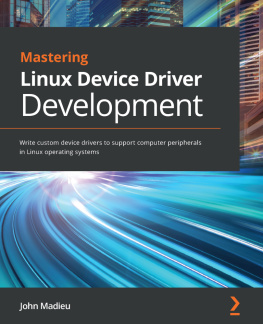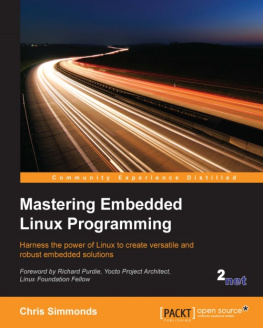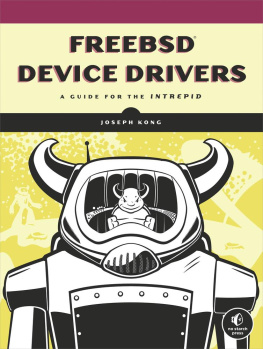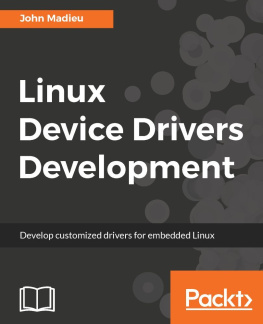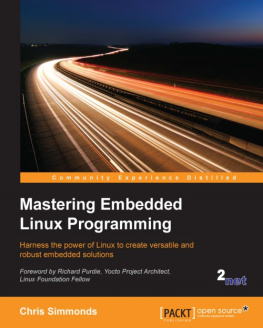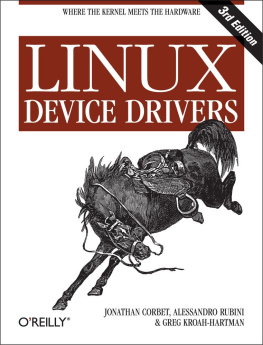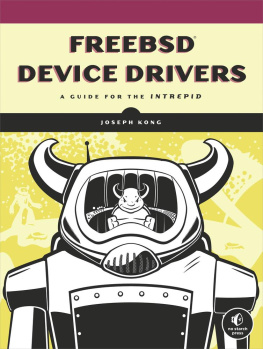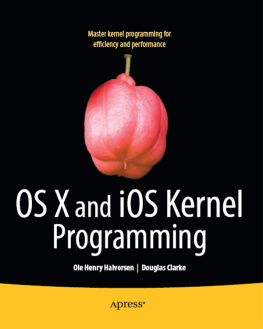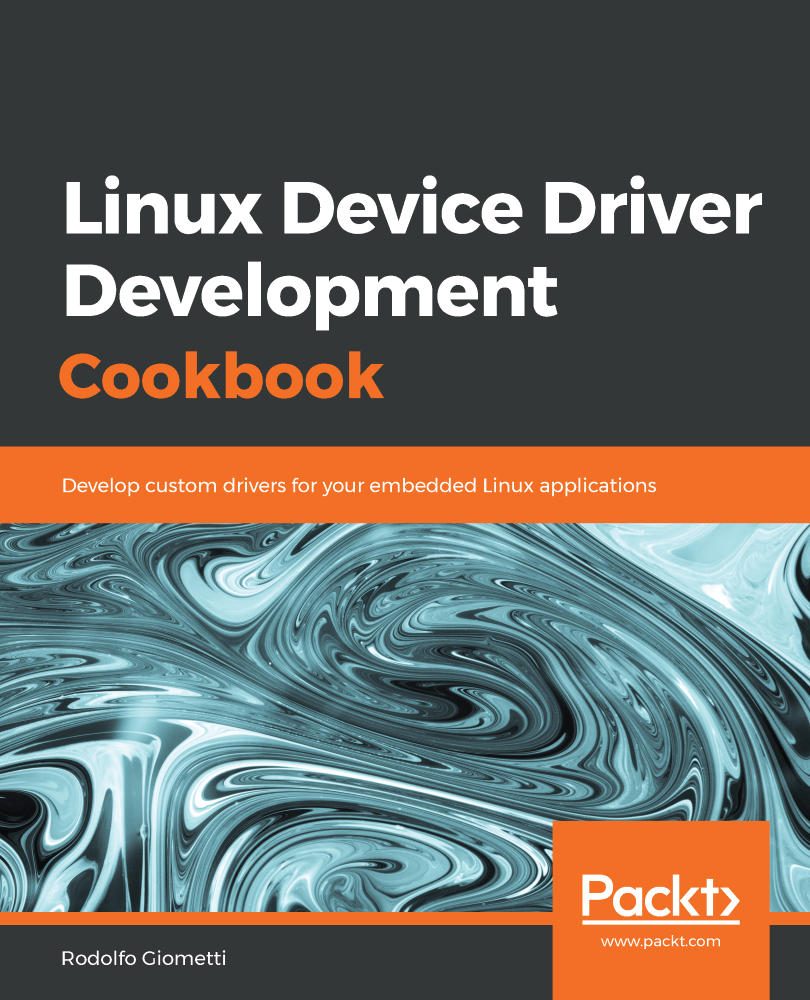
Linux Device Driver Development Cookbook
Develop custom drivers for your embedded Linux applications
Rodolfo Giometti

BIRMINGHAM - MUMBAI
Linux Device Driver Development Cookbook
Copyright 2019 Packt Publishing
All rights reserved. No part of this book may be reproduced, stored in a retrieval system, or transmitted in any form or by any means, without the prior written permission of the publisher, except in the case of brief quotations embedded in critical articles or reviews.
Every effort has been made in the preparation of this book to ensure the accuracy of the information presented. However, the information contained in this book is sold without warranty, either express or implied. Neither the author, nor Packt Publishing or its dealers and distributors, will be held liable for any damages caused or alleged to have been caused directly or indirectly by this book.
Packt Publishing has endeavored to provide trademark information about all of the companies and products mentioned in this book by the appropriate use of capitals. However, Packt Publishing cannot guarantee the accuracy of this information.
Commissioning Editor: Karan Sadawana
Acquisition Editor: Meeta Rajani
Content Development Editor: Ronn Kurien
Technical Editor: Pratik Shet
Copy Editor: Safis Editing
Project Coordinator: Jagdish Prabhu
Proofreader: Safis Editing
Indexer: Rekha Nair
Graphics: Alishon Mendonsa
Production Coordinator: Jisha Chirayil
First published: May 2019
Production reference: 1300519
Published by Packt Publishing Ltd.
Livery Place
35 Livery Street
Birmingham
B3 2PB, UK.
ISBN 978-1-83855-880-2
www.packtpub.com
mapt.io
Mapt is an online digital library that gives you full access to over 5,000 books and videos, as well as industry leading tools to help you plan your personal development and advance your career. For more information, please visit our website.
Why subscribe?
Spend less time learning and more time coding with practical eBooks and Videos from over 4,000 industry professionals
Improve your learning with Skill Plans built especially for you
Get a free eBook or video every month
Mapt is fully searchable
Copy and paste, print, and bookmark content
Packt.com
Did you know that Packt offers eBook versions of every book published, with PDF and ePub files available? You can upgrade to the eBook version at www.packt.com and as a print book customer, you are entitled to a discount on the eBook copy. Get in touch with us at customercare@packtpub.com for more details.
At www.packt.com , you can also read a collection of free technical articles, sign up for a range of free newsletters, and receive exclusive discounts and offers on Packt books and eBooks.
Contributors
About the author
Rodolfo Giometti is an engineer, IT specialist, GNU/Linux expert and software libre evangelist. He is the author of the books BeagleBone Essentials, BeagleBone Home Automation Blueprints and GNU/Linux Rapid Embedded Programming by Packt Publishing and maintainer of the LinuxPPS projects. He still actively contributes to the Linux source code with several patches and new device drivers for industrial applications devices.
During his 20+ years of experience, he has worked on the x86, ARM, MIPS, and PowerPC-based platforms.
Now, he is the co-chief at HCE Engineering S.r.l., where he designs new hardware and software systems for the quick prototyping in industry environment, control automation, and remote monitoring.
I would like to thank my wife, Valentina, and my children, Romina and Raffaele, for their patience during the writing of this book. Thanks to Packt's guys: Meeta, who gave me the opportunity; and Ronn, who helped me in finishing this book. Many thanks to Antonio and Cristian for their efforts in reviewing this book.
Finally, I would thank my parents for giving me my first computer when I was a child, which allowed me to do what I do today.
About the reviewers
Cristian Marussi earned his bachelor's degree in Computer Science at the University of Udine (Italy), and spent almost 15 years working with embedded Linux. Cristian has been lucky enough to journey all the way through the software stack, from the userspace down to the lands of the kernel and firmware, while spanning a wide set of different products, from network appliances to consumer mobile devices. He has a keen interest in OS and system software development and internals. He has worked for companies such as Eurotech SPA, VDS Rail, and Samsung Cambridge Solution Center; he is currently a kernel developer in the OSS department at ARM Ltd. in Cambridge (UK).
Antonio Tringali is an electronic engineer working as a freelancer. He specializes in automation and remote system control. Most of his work in recent years is concentrated on automated parking systems, security access control, renewable energy data processing, and 3D printers. He likes to work from the silicon up, equally at ease with an oscilloscope as he is with a compiler.
Antonio had the pleasure of getting to know Rodolfo years ago, when writing for the same leading Italian Linux magazine. In 2015, he reviewed another of Rodolfo's books, BeagleBone Essentials. Now, he is eagerly awaiting the next book to come from this prolific author's keyboard.
Packt is searching for authors like you
If you're interested in becoming an author for Packt, please visit authors.packtpub.com and apply today. We have worked with thousands of developers and tech professionals, just like you, to help them share their insight with the global tech community. You can make a general application, apply for a specific hot topic that we are recruiting an author for, or submit your own idea.
Preface
Kernel device driver development is one of the most important parts of a complex operating system, which is what Linux is. Device drivers are very important for developers that use a computer as a monitoring or administrative machine in real environments such as industry, domestic, or medical applications. In fact, even if Linux is now widely supported everywhere, new peripherals are created every day, and these devices need drivers to be efficiently used on a GNU/Linux machine.
This book will present the implementation of a complete character driver (usually called a char driver) by presenting all the necessary techniques to exchange data between the kernel and userspace, to implement process synchronization with the peripheral's interrupts, to get access to I/O memory mapped to (internal or external) devices, and to efficiently manage the time within the kernel.
All code presented in this book is compatible with Linux 4.18+ releases (that is, as far as the latest 5.x kernels). The code can be tested on the Marvell ESPRESSObin, which has an onboard ARM 64-bit CPU, but any other similar GNU/Linux embedded device can be used. In this manner, the readers can verify whether what they have read has been correctly understood.
Next page

